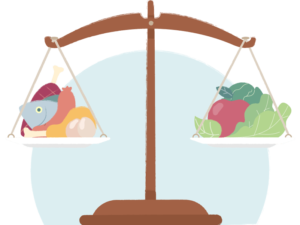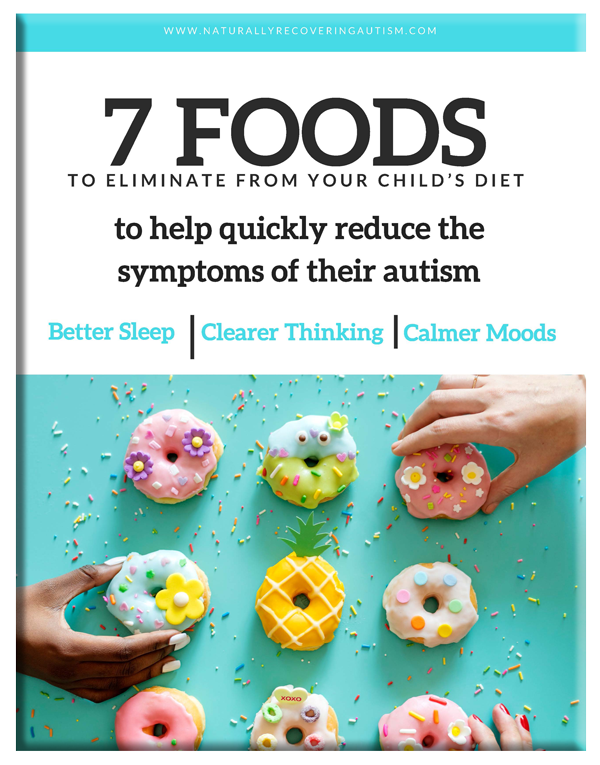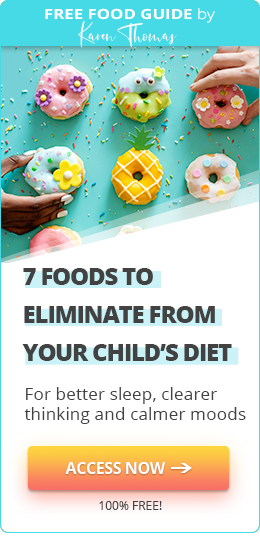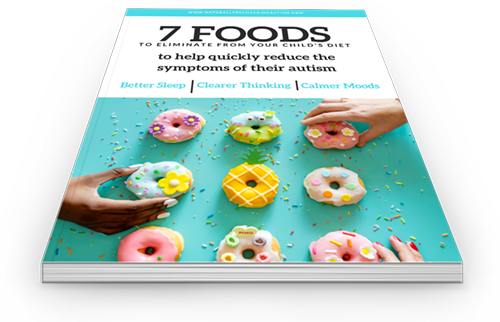FOODS THAT FEED THE BRAIN
In the 1970s, when the book Orthomolecular Psychiatry by the Nobel Prize-winner Linus Pualing, was released, it showed that mental illness on any level could be affected by nutrition as well as medication. At that time, the medical profession, especially psychiatry, disclaimed this knowledge that nutrition was helpful to health, especially emotional health or the functioning of the brain. Today, the information in that book has become elemental in treating chemical and physical disorders that lead to brain dysfunction as well as mental illness.
Medication and supplements are not enough. In order to build the proper levels of neurotransmitters in the brain, certain nutritional needs must be met. Chemical balance relies on enough of the good coming in and the bad being greatly limited.
Hypoglycemia should be avoided at all cost. Hypoglycemia is low blood sugar caused by a drop in blood glucose levels. This can also cause diabetes. It is caused by eating too many refined carbohydrates, such as foods and beverages with white sugar like soda, refined cereals, pastries, etc.
The body responds by releasing hormones that help regulate glucose, such as cortisol from the adrenal glands that help combat stress in the body and growth hormone. It causes depression, irritability, anxiety, fatigue, headaches, blurred vision, slurred speech, mental confusion (brain fog), excessive sweating, emotional and behavioral problems, and sleep disorders. Hypoglycemia causes an excessive release of glutamate in the brain which can lead to the death of neurons in the brain.
Stress is also a strong factor in creating an imbalance in brain chemistry. Stress reduces brain chemicals such as serotonin. This can cause depression, weaken the adrenal function, and increases cortisol levels affecting adrenal function. This can cause irritability, and insulin resistance, therefore creating hypoglycemia, which then goes back to creating more imbalances in brain chemistry.
High Protein 
For most people, eating a high protein and low carbohydrate diet is the most beneficial way to eat for their brain and helps promote concentration. It also keeps blood sugar levels in balance. Protein helps build dopamine, serotonin, and norepinephrine, which help improve focus, motivation, and mood.
Keep high protein snacks around such as hard- boiled eggs, protein bars, and celery with almond butter on it. Reducing simple sugars and carbohydrates is also essential to brain health and behavior. Sugar causes anxiety, irritability, and anger.
DIET TIPS TO REMEMBER: (Organic only)
- Good protein choices are chicken, turkey, fish, eggs, cheese (goat or sheep).
- Complex carbohydrates are best because it takes the body longer to break them down due to fiber content. Good choices are vegetables.
- Sugars and simple carbohydrates, as a rule, should be kept to a minimum. This means fruit juices and even most fruits. Fruit with lower sugar content are pears and apples. Apples also help to build dopamine. Higher sugar content fruits are grapes, dates, and bananas. Carrots tend to have high-sugar content also, so their intake should be kept to a minimum. Reduce or remove processed carbohydrates from the diet.
- Healthy fats are essential for brain health and function (omega-3 fatty acids, avocado, nuts, olive oil, coconut oil)
- Vitamins A, C, and E help concentration by increasing blood flow to the brain. Antioxidants are also helpful (antioxidants were covered in the chapter on basic nutrition).
- B complex vitamins can be helpful too, especially vitamin B6 which has been as effective as Ritalin in improving focus.
Protein foods in our diet should vary so that we get a complete protein to include all eight essential amino acids. They are the building blocks of protein. Some good sources of protein are eggs, poultry (especially turkey), fish and seafood, meat, beans, nuts, and seeds. Eggs and turkey contain higher levels of tryptophan, which builds serotonin. The neurotransmitter, or brain chemical that assists with sleep, appetite, and mood control.
Vegetarians need to be especially careful to eat the proper combinations of vegetable, fruits, and the right grains to get all eight of the essential amino acids. Their diet tends to lack B vitamins which feed the brain essential amino acids necessary to build neurotransmitters.
Sometimes the body is deficient in the vitamins and minerals necessary to make neurotransmitters. When this happens, Any problem can arise from anxiety and depression to autism or schizophrenia. Though it may have started with a deficiency of only one nutrient, through an event of chain reactions in the body, it becomes a deficiency of many. It is never just one thing alone. Malabsorption can then occur and metabolism breaks down. Your child’s body is deprived of even more than it started with and his brain does not get what it needs to work the way it is supposed to.
The main important thing to remember is that proteins help us think, carbohydrates reduce our ability to think and concentrate. The digestive tract must be working properly for the brain to get the necessary neurotransmitters, and healthy microbes it needs for proper communication. The gut must be healed!
MTHFr and Methylation
With the MTHFR mutation metabolic issues are common, and so is the deficiency of folate, vitamin Methyl B12 , (vital for proper function of many things including methylation, digestion and food absorption), and pyridoxine (vitamin B6, for brain function and coping with stress), or mutations of related enzymes. Folate is natural and comes from food sources such as green vegetables, beans and other whole plant foods. It is responsible for synthesizing DNA, making red blood cells, transporting oxygen, and supports the functioning of our nervous and cardiovascular systems. Adequate B vitamins, including folate are also necessary for proper cognitive function.
Folic acid is synthetic and commonly in multivitamins and fortified foods. This can cause excess to build in the body. The body has a limited ability to convert folic acid to folate. Too much folic acid can affect gene expression, may reduce immune system function, and exacerbate vitamin B12 deficiency.
Good Fats That Feed and Protect the Brain
Good fats feed the brain. Some good choices are coconut oil, olive oil, avocado, and macadamia nuts. It is also critical to supplement with omega 3 fatty acids.
OMEGA-3 FATTY ACIDS
Omega-3 fatty acids protect the brain and help to rebuild damaged areas. They contain the omega-3 fatty acids that are essential for the health and functioning of the brain. Deficiency in omega-3 fatty acids can cause issues with moods such as depression, hyperactivity, lethargy, memory loss, cell energy production, and cognitive learning ability.
The neurotransmitters most affected by omega-3 fatty acids are dopamine, affecting motivation and drive, and serotonin, important in sleep, mood, and appetite. This is also why omega-3s are significant when used in treating depression, anxiety, violent and aggressive behavior, and even schizophrenia.
Be sure to avoid the bad fats. They reduce the good fats in the body and are inflammatory. Get my free guide to the top 7 foods to eliminate to quickly reduce your child’s symptoms of autism, and provide improved health and behavior.
Exercise, eating a balanced nutritious diet, and learning ways to cope with stress are all crucial factors in healthy brain chemistry, but sometimes we need more help. What we do not need are negative or even dangerous side effects.
Histamines
Histamine sensitivities are extremely common in children with autism. Histamines are released by the digestive tract and the brain. When the DAO enzymes are mutated then it is difficult to remove histamine. Histamine reactions come from the body having an allergic reaction. The body sees a food as an allergy when the immune system gets triggered to release histamine. Common symptoms are hives, extreme mood changes, poor sleep, Common causes are related to leaky gut and the MTHFR gene mutation. This can happen when an ill gut blocks methylation (MTHFR).
High histamine foods to avoid:
- Leftovers that contain protein such as those left in the refrigerator, especially left over meat. This is why leftover soup broth can affect some people adversely even though it is a good gut healer.
- Alcohol
- Pickled, fermented or canned foods – sauerkrauts
- Aged cheeses
- Smoked meat products such as salami, ham, and sausages
- Shellfish
- Beans such as chickpeas, soy beans, peanuts
- Nuts like walnuts, cashew nuts
- Chocolates and other cocoa based products
- Most citric fruits
- Strawberries
- Wheat based products
- Vinegar
- Salty snacks
- Preservatives
- Artificial colorings
MONOSODIUM GLUTAMATE (MSG)
Used as a flavor enhancer or artificial flavor, the most commonly used excitotoxin in our food is monosodium glutamate, also known as MSG. It is cheap to use and it will fool your brain into thinking that the food tastes better than it does. Food manufacturers and restaurants know and like this.
The USDA has defined MSG as “naturally occurring,” so it is allowed in our food and is regarded by them as safe. Do not be fooled by this. MSG is known to cause behavioral problems, and worse yet, MSG excites neurotransmitters (the brain’s messengers). Nerve cells become so excited that they are excited to death, and the effects begin in as little as 15 minutes after ingestion.
Monosodium glutamate (MSG) also negatively affects neurotransmitter levels.There can be up to an 80% drop in acetylcholine, which is involved in learning and memory. Focus is also greatly impaired by MSG. Aggressive behavior, loss of emotional control, and hyperactivity are common symptoms.
The artificial sweetener aspartame is also an excitotoxin.
For a positive natural sweetener alternative that does not affect the glycemic index, or affect blood sugar, or feed the candida in the gut which thrive on sugar, try organic green leaf stevia.
FREE Guide to the top 7 foods to eliminate to quickly reduce your symptoms pf autism, and create better sleep and calmer behaviors.
Studies Show This Diet to Reduce Seizures By Fifty Percent
Over seventy studies show the ketogenic diet to reduce the frequency of seizures by fifty percent in children. Many became completely seizure free. The ketogenic diet has been used clinically for over 80 years for seizures in epilepsy. It is both safe and effective.
percent in children. Many became completely seizure free. The ketogenic diet has been used clinically for over 80 years for seizures in epilepsy. It is both safe and effective.
A ketogenic diet consists of protein eaten with 80-90 percent good fats such as olive oil, coconut oil, macadamia nut oil, and avocado. An additional strong component of this diet is the elimination of processed carbohydrates. This causes the body to burn fat instead of sugar, or glucose. See studies.
EXERCISE
Aerobic exercise where you increase your heart rate for 30 to 45 minutes, 5 times per week, is crucial for increasing blood and oxygen in the brain and for releasing and building neurotransmitters, especially serotonin. When we exercise, it increases the brain’s ability to build serotonin. This is one of the reasons we feel calmer after exercise. This is also why exercise is so helpful with depression.
One of the prescriptions for my son was aerobic exercise. This means biking, running, swimming, or something similar that gets the heart rate up and keeps it up. For every hour on the computer, he had to exercise for an hour. Exercise helps rebuild dopamine levels, serotonin levels, oxygenate the brain, increase the blood supply to the brain for better focus, reduce stress hormones, and increase beta-endorphins. Increased endorphins and serotonin help to elevate mood. Studies have shown that exercise is as effective as antidepressant drugs in the treatment of depression.
Podcast shows in the brain series:
The Brain and Behaviors: # 80
Natural supplementation for the brain: #81
The Function of Neurotransmitters and Their Disruptors #76
Quickly Reduce Your Child’s Symptoms
of Autism by Eliminating 7 Specific Foods that Most People Consume Daily!
The first crucial step of autism recovery is to begin restoring health to the gut and the immune system.
The health of the gut is directly linked to the health of the brain and therefore to the symptoms of autism. In fact, 80% of the immune system comes from the gut so if the gut is not healthy, then the brain can’t thrive, and the immune system is compromised. It’s a vicious cycle, but thankfully, it’s one that we can put an end to by first eliminating harmful foods.
This is for informational purposes only and is not meant to diagnose or treat. Every child’s level of recovery is different. No two people are the same. It is never implied that all children will have the same outcome. Results are all based on individual biology and the work that is done. This process takes time and various steps, effort and resources need to be weighed. Our programs are intended to help you become more knowledgeable and guide you to help bring your child a better quality of life, whatever that may be. We want to help by giving great content, direction and strategies that move you forward. Nothing on this page or any of our websites is a promise or guarantee of results or future outcomes. The results on this page and any of our websites are not typical or promised. In fact, there will be people who purchase this and other programs and never put the work into implementing the strategies taught and therefore will achieve little to no results. Our more detailed earnings disclaimer, privacy policy, and terms and conditions for this program and website can be accessed via the links below. We hold ourselves (and you) to a high standard of integrity. We are cheering you on every step of the way.











